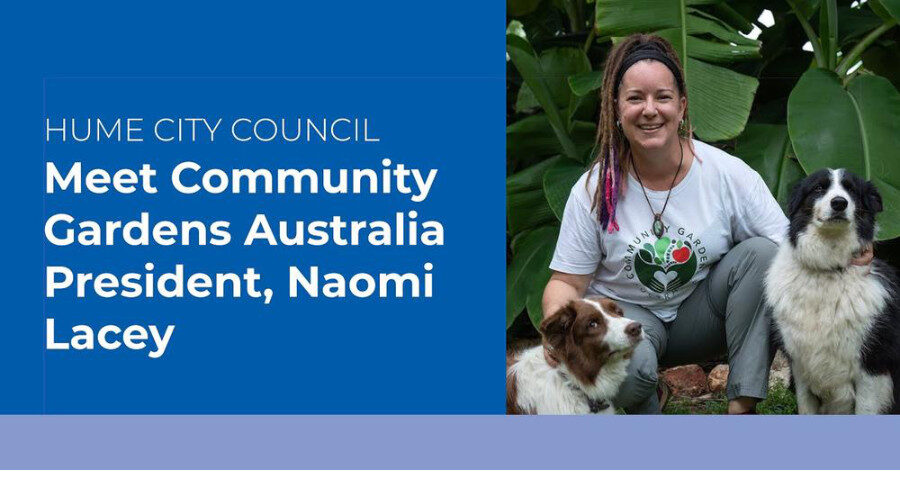Hume Community Gardeners meet Naomi Lacey
Video from Naomi’s presentation from 13 August 2024.
Hume City Council invited CGA President Naomi Lacey to speak with the community about governance and action in community gardens. Find out more about the five community gardens within the Hume City Council area.
About Naomi Lacey
Naomi is a permaculturalist passionate about promoting healthy food systems, sustainable lifestyles and cultivating community. She helped establish the first community garden in the satellite city of Palmerston near Darwin and became involved with Community Gardens Australia (CGA) in 2015 then took on the role of President five years ago.
Naomi believes that community gardens have a pivotal role in ensuring better health outcomes for Australians, building community, addressing the climate crisis, reducing waste and educating people.
Awarded a Churchill Fellowship in 2019 to learn from community garden networks around the world, Naomi’s vision for CGA is to build the organisation into one that supports the growth and needs of community gardens around Australia, providing them with education, support, resources and sustenance to continue their work and therefore their positive impact on the communities they reside in.
History of the Network
Naomi talks about the early beginnings of the community garden network in Australia — watch the video below to find out more.
How we define community gardens
We consider any garden that allows community participation to be a community garden and will provide our support. Examples:
- community gardens
- school gardens that are open to the wider community
- city farms that allow community participation/workshops etc
- CSA’s that allow community participation/workshops.
Community gardens are as diverse as the community that grow them.
Community garden results in…
- improved physical and mental health
- increased consumption of organic fruits and vegetables
- reduction of organic waste to landfill
- increased community connectedness
provision of green sp[aces - reduction of food miles due to increased consumption of local food
- cooling the urban heat sink
- contributing to community cohesion and welfare
- increased food security.
Community gardens in recent times:
- community gardens continue to grow in popularity
- the benefits are widely known and well-documented
- 2023 survey shows over 300,000 volunteer hours per year in community gardens
- 72% of survey respondents reported that involvement in their community garden helped to reduce their weekly food costs, and increase of 7.1%on the previous year
- people want to east food that is healthy, tastes great, is low cost and that has decreased food miles
- people are looking for a connection with nature and other people
- 315,500 people visit community gardens each year in Australia.
Winston Churchill Trust
Naomi chatted about her Churchill Scholarship.
Why is good governance so important?
- it promotes long-term viability of the garden — this includes managing resources wisely and fostering a culture of respect and responsibility among gardeners
- proper governance helps create an inclusive environment where diverse community members feel welcome and valued
- clear rules and communications channels help prevent and resolve conflicts
- well-governed gardens foster a sense of community and collaboration
- effective governance involves transparent financial management and fundraising efforts to support the garden’s needs.
How do we ensure good governance?
- clarify the garden’s mission, whether it’s for food production, education, recreation, or community building
- our model rules or our constitution are our guide
- develop garden rules
- keep accurate records
hold regular meetings - build partnerships and seek support
- regularly review the gardens progress
- encourage community engagement,
Looking forward…
- CGA will work harder to establish good relationships with all levels of government
- we will work towards ensuring legislation and policy are supportive and facilitate the establishment of new gardens and maintenance of existing gardens
- we will develop new, up to date resources for the sector
we will continue to develop and expand our volunteer network and evolve our communications to work with that - we will continue to seek out appropriate funding to ensure we are able to achieve our aimns inb line with our Ethical Partnerships Policy
- we will maintain national and international ties to enable the sharing of:
- best practice
- good programs
- shared educational opportunities.
Together we are stronger!
Watch the video of Naomi’s presentation below:

